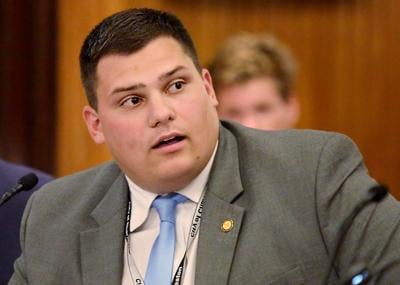Three years after his exit from local politics, former Charleston City Councilman Harry Griffin now faces multiple campaign finance violations, including accusations by state ethics officials that he funneled more than $11,000 in campaign funds to a personal account.
The S.C. Ethics Commission has leveled 39 charges against Griffin, according to a complaint and hearing notice obtained by The Post and Courier. The case is scheduled to be addressed June 20 in Columbia.
The potential infractions span the entirety of Griffin's tenure in public office, from his first City Hall campaign in 2017 to his brief 2019 flirtation with a mayoral bid and all the way through to his first political defeat in 2021.
Repeated attempts to contact Griffin for comment through cellphone messages, phone calls and text messages were not immediately successful April 29 and 30.
Griffin, a 2016 graduate of The Citadel, made a splash when at 22 he became the youngest elected member of Charleston City Council in recent history.
He faces the following ethics charges:
- Five counts of failing to disclose campaign contributions.
- One count of failing to disclose campaign expenditures.
- Two counts of excessive cash withdrawals.
- 31 counts of using campaign funds for personal use.
Griffin could face a stiff fine from the S.C. Ethics Commission of up to $2,000 per count, meaning a potential maximum penalty of $78,000.
Griffin could also be required to forfeit "gifts, receipts, or profits" obtained. State ethics officials have 60 days after a hearing to decide whether an ethics violation occurred and determine any fines or reprimands.
South Carolina law prohibits candidates from using campaign dollars for personal use.
"No candidate, committee, public official, or political party may use campaign funds to defray personal expenses which are unrelated to the campaign or the office if the candidate is an officeholder nor may these funds be converted to personal use," the campaign practices section of the law states.
The campaign dollars Griffin allegedly converted to personal use came from a mix of Griffin's city council campaign account and his mayoral campaign account. Griffin ultimately opted not to run for mayor in 2019 after publicly considering it.
The amounts listed by the ethics report range from as small as $4 to as large as $1,500. The dollars were reportedly transferred to Griffin's personal account, according to state ethics officials.
In one example, Griffin reportedly doubled-dipped into his campaign coffers on Christmas Eve 2019, transferring $15 from his city council campaign account and another $15 from his mayoral campaign to his personal account.
The total amount of campaign funds Griffin reportedly transferred to a personal account totaled $11,595.92.
In 2017, Charleston City Council members received an annual salary of $17,500.
Meghan Dayson, the executive director of the state Ethics Commission, declined to discuss specifics of the Griffin investigation, including what the money was used to purchase, if anything.
The state agency began investigating Griffin's campaign account after West Ashley resident Edward Sutton filed a complaint on Aug. 24, 2021. In his complaint, Sutton noted he had seen online ads from Griffin's mayoral bid but had not seen the expenses listed in campaign finance reports.
Sutton, who is now a Democratic candidate for a Charleston seat in the S.C. Senate, said one of the reasons he decided to run for public office was because he wants to push for stronger ethics laws and their enforcement.
"No one is above the law. Ethics and integrity matter," he said when asked why he filed the 2021 complaint.
For a single four-year term, Griffin represented a portion of outer West Ashley east of Highway 61 and north of Interstate 526 as well as north of Bees Ferry Road.
Griffin entered office calling for a unified District 10 and had early goals of working on short-term flooding solutions. He opposed Charleston's apology for slavery and led a petition for West Ashley residents to secede from Charleston if city leaders approved a tax hike.
Griffin also called for an audit of the mayor's office.
His final years in office were marked by criticism and turbulence. Griffin was accused of speaking with members of the Proud Boys, a far-right hate group, about a rally that was held in downtown Charleston in 2020. He later denounced the Proud Boys.
He was also caught on tape insulting some of his fellow council members, spurring city council to create a code of conduct for its members.
In May 2021, he was arrested on suspicion of driving under the influence. The case was later dismissed.
According to documents filed by the Ethics Commission, Griffin's first potential misstep came before he was elected when he transferred $199.92 in campaign funds to a personal account on Sept. 18, 2017 — less than 60 days before that year's general election.





